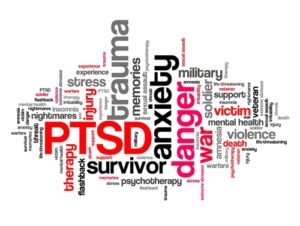
Veterans and others with post-traumatic stress disorder (PTSD) may have flashbacks or other negative reactions and increased anxiety when exposed to situations that remind them of the stressor that caused their condition. This often includes loud noises, accidental touches, or certain sights or smells. Understanding PTSD and its symptoms as well as identifying PTSD triggers are key to managing it.
Each Veteran Has Their Own PTSD Triggers
PTSD, previously called “shell shock” or “combat fatigue,” has long been a common diagnosis for veterans who saw combat or who lost fellow service members during training or service. PTSD causes veterans to endure intense flashbacks, nightmares, and other disturbing thoughts and emotions related to the trauma they experienced. They often report feeling sad or angry and may have difficulty relating to others.
While some of these intense memories, thoughts, and emotions occur without an obvious trigger, certain people, situations, sounds, sights, and smells can trigger them as well. Some common triggers include:
- Television shows related to their trauma, war or other similar traumatic events
- Certain conversation topics
- Disputes or anger, often unrelated to the trauma
- Crowded events or areas, such as large social events, games or concerts
- Noises, especially those that remind them of the trauma
- Unexpected or unwanted touches
The Department of Veteran Affairs (VA) and private doctors have treatments for veterans to work through their trauma and manage their PTSD.
VA Offers Several Options for PTSD Treatment
VA recognizes PTSD as a serious threat to the health and livelihood of millions of veterans. It is one of the most common reasons veterans apply for and receive VA disability benefits. Because of the widespread need, VA offers a number of options for getting treatment for this condition. PTSD treatment offered by VA includes:
- 1-on-1 mental health assessment and testing to diagnose PTSD
- Prescription medication regimens for managing PTSD while undergoing other treatment
- Individual trauma-centered psychotherapy, including Cognitive Processing Therapy (CPT)
- Family therapy
- Group therapy for related needs, such as anger management or stress management
- Group therapy for those who served in certain wars or combat zones affected by similar stressors
- Residential or inpatient programs for those with severe disabilities related to PTSD
Each VA Medical Center (VAMC) has its own PTSD specialists who work with the veterans at that facility. They can help you get tested for PTSD and identify the type of treatment that might be best for you. Many VA outpatient clinics also have PTSD specialists.
Qualifying for VA Disability Benefits
If you struggle to live a normal life or cannot work because your triggers cause significant anxiety, or for another reason linked to your PTSD diagnosis, you may consider filing a claim for VA compensation for PTSD.
Service connection for PTSD may qualify you for a VA disability rating. In order to establish entitlement to service connection, you will need to provide evidence that:
- You have a PTSD diagnosis
- You endured a stressor during your time in service, for example, exposure to combat, a serious injury, personal trauma, or sexual violation, or a threat of injury, death or sexual assault and
- Your PTSD diagnosis is at least as likely as not related to your in-service event.
If VA denied your claim for PTSD benefits or gave you a low disability rating and you believe you deserve more, you have the right to challenge the decision. A VA disability advocate can help. Call (888) 373-4722 about your disability claim today.



